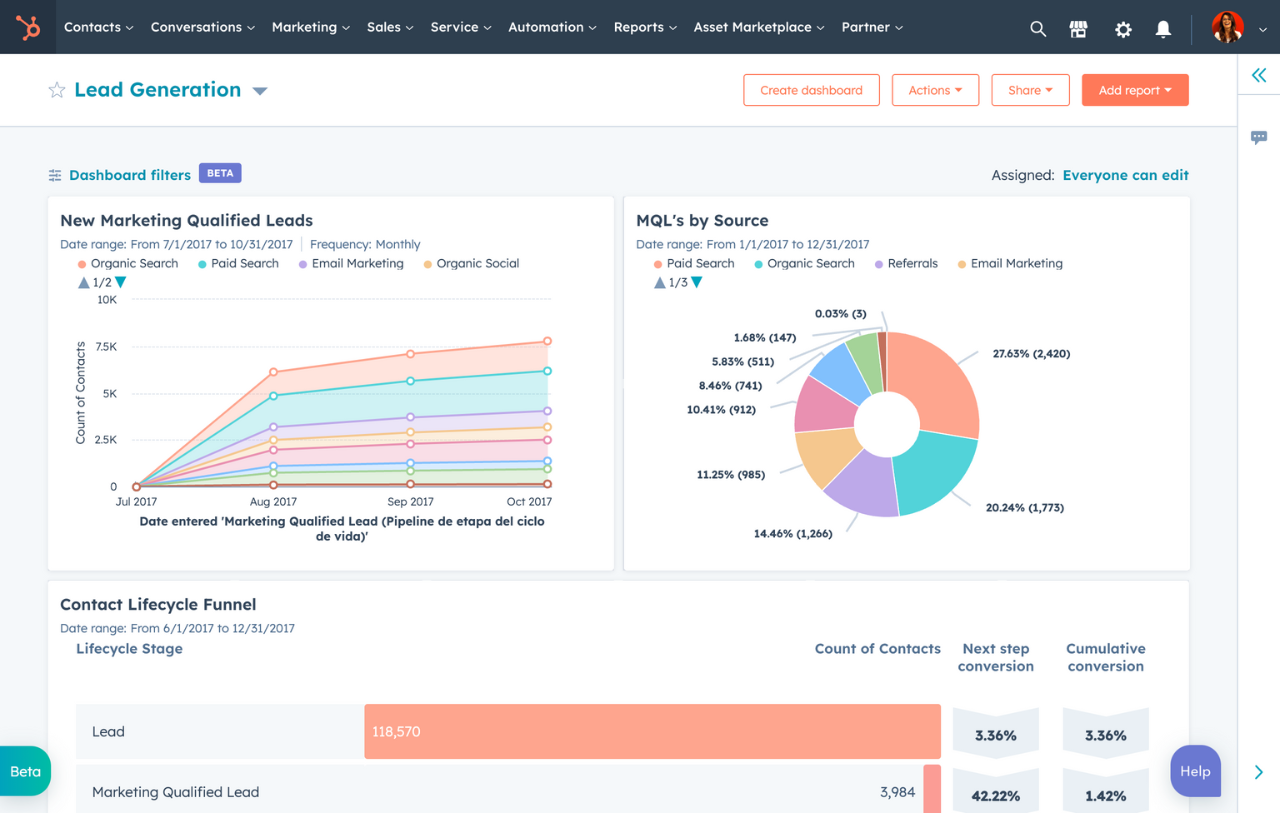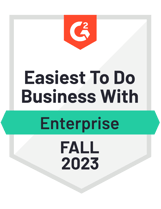Salesforce Sales Cloud vs HubSpot Sales Hub
Get started with Sales Hub today!
HubSpot Sales Hub
HubSpot is a customer platform with all the software, integrations, and resources you need to connect marketing, sales, content management, and customer service. Each product in the platform is powerful on its own, but the real magic happens when you use them together.
Sales Hub is HubSpot’s easy and powerful sales automation software that connects without complexity, drives productivity with easy-to-adopt tools, and helps growing sales organizations prospect smarter, accelerate revenue growth, and scale insightfully.
Salesforce Sales Cloud
Salesforce is a cloud-based customer relationship management (CRM) platform with applications for sales, service, marketing and more that help bring customers and companies together.
Sales Cloud is Salesforce’s sales CRM that includes automation tools, reporting, deal management and more.
Unlock the Power of AI-Powered Sales Automation: Free Comparison Guide
Discover which sales automation platform is right for your business. Get our comprehensive PDF guide that breaks down the features, benefits, and differences between HubSpot Sales Hub and Salesforce Sales Cloud.
Make an informed decision and supercharge your sales efforts today!

Download our FREE PDF Guide Comparing HubSpot Sales Hub and Salesforce Sales Cloud

Key Capabilities of Sales Hub
-
More connected: Sales Hub connects your data and people without the cost and complexity of multiple tools and legacy CRMs.
-
More productive: Sales Hub provides a connected, crafted UI experience for faster activation and better adoption, so reps can spend more time actually selling.
-
More supported: HubSpot makes sure you have the help when you need it with HubSpot’s world-class customer support, award- winning HubSpot Academy, and Professional Services designed to maximize the power of Sales Hub.
What Sets HubSpot Apart
More Connected
What Salesforce Offers:
- Salesforce has grown through acquisitions such as Pardot, which can typically create a less integrated experience for users and customers.
- Sales Cloud has pre-built reports and reporting functionality to help monitor pipeline, sales team productivity, & forecast future revenue. Advanced sales reporting and forecasting usually requires add-ons.
- The Salesforce App Marketplace allows customers to integrate third party tools.
What Sets HubSpot Apart:
- Sales Hub gives sales leaders total visibility into sales metrics--without waiting in line for help from an admin or analyst. HubSpot's out-of-the-box reporting software is powerful yet easy to use, with deep pipeline insights to accurately forecast performance and coach teams to hit their goals.
- Built on HubSpot’s connected customer platform, Sales Hub has tools like Playbooks, Email Templates, Unified Reporting, and Lead Scoring to help increase alignment and encourage collaboration between Sales and Marketing teams. No connectors or data sync required!

Sales Hub customers see their average deal amount increase by 18% on average after 12 months. (Hubspot Annual ROI Report)
More Productive
What Salesforce Offers:
- The cadences feature in Sales Cloud guides reps through the prospecting and opportunity nurturing processes by notifying them when to email a prospect, when to call and when to wait.
- Sales Cloud Einstein is an AI-powered service that can be integrated with the Salesforce CRM to offer a variety of predictive and analytical insights. Sales Cloud Einstein requires add-ons.
What Sets HubSpot Apart:
- With Sales Hub, you can create accurate sales forecasts, manage and maintain strong sales pipelines and maximize revenue by prioritizing the most important deals.
- HubSpot helps you store, track, manage, and report on each action a customer makes throughout the sales cycle. You can also customize reports to monitor the deal metrics and performance you care about most.

Sales Hub customers close 36% more deals on average after 12 months. (Hubspot Annual ROI Report)
More Support
What Salesforce Offers:
- Salesforce charges 30% of your net contract price for 24/7 premier support. When selecting a support plan, you’ll want to carefully forecast how much your team will need.
- Salesforce has a robust support and training community on its Trailhead platform.
What Sets HubSpot Apart:
- 24/7 customer support is included with every plan. For Enterprise customers, phone is included at no extra charge.
- Maximize Sales Hub's power and learn everything you need to know about the most sought-after business skills within the award-winning HubSpot Academy.
.png?width=1280&height=813&name=managers-coaches-en%20(1).png)
Customers take an average of 35 days to activate Sales Hub. (Hubspot Annual ROI Report)
Feature Comparison
-
HubSpot Differentiated Features
Sales Hub EnterpriseAvailable
- Custom goals
- Conversation intelligence
- Recurring revenue tracking
- Predictive lead scoring
- Full Sandbox
Not Available
-
Salesforce Differentiated Features
Sales Cloud EnterpriseAvailable
- Enterprise Territory Management
Not Available
Sales Software That Grows With You
Start with free tools and upgrade as you grow, or hit the ground running with one of our premium editions.
Total Cost of Ownership
HubSpot
HubSpot Sales Hub helps teams close more deals, deepen relationships, and manage their pipeline more effectively — all on one connected platform.
- Implementation: The average time to activation for Sales Hub Ent is less than 2 months and 84% of Sales Hub Enterprise customers display high feature usage (source).
- Service & Support: HubSpot provides different support channels depending upon your subscription, all included.
- Customization & Configuration: HubSpot Smart CRM users are 1.7x as likely as Salesforce users to describe their CRM as highly customized.*
Salesforce
The Salesforce pricing may look pretty straightforward, but it’s layered and more complex with add-ons and supplemental costs than at first glance.
72% of Sales Hub Professional and 84% of Enterprise customers display high Sales Hub feature usage.
Read more in the HubSpot Annual ROI Report.
*Source: These insights are based on the results of a 3rd party survey paid for by HubSpot conducted online among software end-users at businesses in the U.S. by Beall Research from April 30-May 27, 2021 (Source). HubSpot (n=255), Salesforce (n = 212).
| Capability |
HubSpot
|
Salesforce
|
|---|---|---|
|
Base License
|
$$
Sales Hub Enterprise |
$$$
Sales Cloud Enterprise |
|
Onboarding
|
$
|
$$
|
|
Service & Support
|
Phone, Chat & Email support included
|
30% of net licensing fees
|
|
Training & Educational Resources
|
Included:
HubSpot Academy, Community |
Included:
Trailblazer Academy, Community |
|
Migration
|
Not Required |
$$
Add-on |
|
Customization/Configuration
|
Easy to customize & configure in-house
|
$$$
Often requires partner or developer support |
|
Developer Support
|
$
|
$$
|
|
Integrations
|
$
App MarketPlace |
$$
Salesforce AppExchange |
|
Time to Value
|
$
57 days to activation |
$$
~ 6 months to 1 year |
|
Maintenance/Admin
|
Enjoy a seamless platform
built on one code base Admin not required |
$$
20 work hours to configure, regular updates required from a developer or partner 20-30 person admin team |
|
Sandbox
|
Included
|
$$
Add-on |
|
—
|
|
—
|
Please note that HubSpot’s pricing and packaging is subject to change. Please consult HubSpot’s Product & Services Catalog for the most up-to-date pricing and packaging information. For more information on Salesforce Sales Cloud pricing, visit their pricing page.
Calculate Your ROI with HubSpot
Calculate the return on investment (ROI) you could experience with HubSpot products using our free and easy-to-use ROI Calculator. You can also calculate the total cost of ownership (TCO) of your HubSpot software based on aggregated data from 177,000+ HubSpot customers globally.
What are customers saying?
We were using HubSpot as our marketing tool and Salesforce as our sales tool. So when a lead became a sales opportunity, we had to take all the information out of HubSpot and copy it into Salesforce. It was time-consuming and inefficient." After looking at different alternatives, Feyi decided to implement Sales Hub Enterprise. She chose this solution over Salesforce because it’s part of HubSpot’s CRM Platform, an integrated suite of marketing, sales, and customer service tools. “We set up our sales process without having to hire a CRM engineer,” says Feyi. “We could set up new fields, permissions, sequences, and reports without adding to our overhead.
Feyi Olopade Ayodele
CEO
CancerIQ
HubSpot is trusted by over 205,000 businesses in more than 135 countries.
Related Resources

Free Meeting Scheduler
Meeting Scheduling made easy. Schedule meetings faster and forget the back-and-forth emails. Your calendar stays full, and you stay productive.

Build Your Automation Strategy
Building an Effective Automation Strategy in HubSpot Learn how to define and implement an automation strategy by using workflows in HubSpot.
.png?width=567&height=612&name=2023_SalesHub_Conversation_Intelligence%20(1).png)
HubSpot & Salesforce Integration
Sync HubSpot with Salesforce for a fast, reliable, and powerful integration between your two databases. No technical setup required.
Close More Deals with HubSpot today!
Use HubSpot Sales Hub to help teams close more deals, deepen relationships, and manage sales pipelines more effectively.








